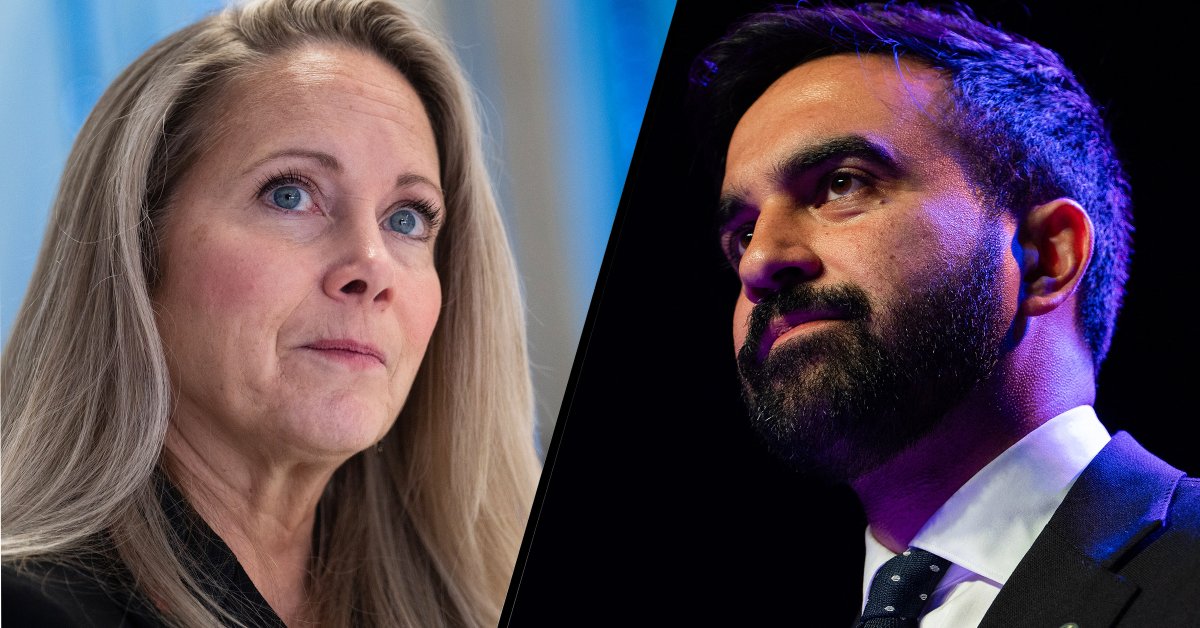In the wake of Zohran Mamdani’s surprise primary success in New York City’s mayoral primary, prominent Democrats across the country have kept unusually quiet. Rep. Laura Gillen, a freshman Democrat in Congress representing part of Long Island, took a different approach: she issued a sharp, immediate rebuke.
“Socialist Zohran Mamdani is too extreme to lead New York City,” Gillen said in a statement released Wednesday morning. “His entire campaign has been built on unachievable promises and higher taxes, which is the last thing New York needs.” She went on to accuse Mamdani of promoting “a deeply disturbing pattern of unacceptable antisemitic comments,” referencing his refusal during the campaign to denounce the slogan “globalize the intifada,” and his comparison of it to the Warsaw Ghetto Uprising.
“He is the absolute wrong choice for New York,” she concluded, making her the first Democrat in Congress to publicly oppose Mamdani’s candidacy.
It was a striking move from a Democrat whose district borders the city where Mamdani just toppled former Governor Andrew Cuomo, a party heavyweight with near-universal name recognition. But Gillen’s district—NY-4, a swing seat anchored in Nassau County on Long Island—is far from the progressive epicenter of New York City. It is among the wealthiest districts in the country, home to a large Jewish population and a substantial number of moderate and independent voters. Gillen flipped the district in 2024, and her political survival may depend on maintaining daylight between herself and the party’s leftmost edge.
In an interview with TIME on Thursday, Gillen doubled down on her criticism, arguing that Mamdani’s vision of fare-free public transit, rent freezes, city-run grocery stores, and steeper taxes on the wealthy is not just ideologically extreme, but structurally unsound.
“Saying things like ‘we’re going to give away free everything’ is not realistic, and it’s not the direction the Democratic Party should go in,” she says. “They should find ways to make people’s lives affordable in tangible ways, and say we will reach across the aisle to do that.”
Read More: Zohran Mamdani’s Success Sparks a Democratic Reckoning—and a GOP Attack Plan
Gillen dismissed the notion that Mamdani’s victory signaled a larger ideological shift for the party. “This is hardly a mandate or some grand proclamation about where Democrats are,” she said, pointing out that fewer than one in three of the city’s registered Democrats turned out in the primary.
Mamdani, a 33-year-old assemblyman and member of the Democratic Socialists of America, declared victory in the party’s primary for mayor of New York City early Wednesday. His win was powered by a coalition of younger voters, left-leaning activists, and progressive organizations—the same political base that helped launch the careers of Rep. Alexandria Ocasio-Cortez and other progressive candidates over the past decade. Mamdani told MSNBC a day after the primary that his populist campaign could be deployed anywhere: “I think ultimately this is a campaign about inequality, and you don’t have to live in the most expensive city in the country to have experienced that inequality, because it’s a national issue,” he said.
Read more: Meet Zohran Mamdani’s Wife, an Illustrator He Met on Hinge
But his win has sparked a wave of GOP attacks and triggered a fresh round of soul-searching among Democrats. Prominent Republicans, including President Donald Trump, have already moved to frame Mamdani as the “new face” of the Democratic Party ahead of the 2026 midterms.
“I’m sure the Republicans would like to say that all Democrats are socialists,” Gillen says. “But in fact, I think the people in my district know quite clearly that I am not a socialist. I am a Democrat.”
Rep. Mike Lawler, a New York Republican and potential gubernatorial candidate, echoed that strategy in an interview with TIME on Wednesday, warning that Democrats now face a brutal political dilemma. “If they own [Mamdani’s views], voters will not take kindly to them. If they disavow them, their base will revolt,” he said.
Gillen said she has received some pushback on social media since issuing her statement, but she insisted that other Democrats share her view privately. The hesitation among Democrats may reflect the precarious balancing act they face: while Mamdani’s rise represents the kind of base enthusiasm many Democrats feel the party sorely lacked in 2024, it also poses a threat in more moderate or conservative-leaning districts that are essential to retaking the House.
Larry Sabato, director of the University of Virginia’s Center for Politics, warned that Democrats may already be nearing the limits of how far left they can lean without alienating the broader electorate. “They reached it during Biden,” Sabato says. “And they certainly reach it if they try and parallel what Bernie or AOC are doing—or now Mamdani. That doesn’t fit most districts. It doesn’t fit most states.” But he noted that Democrats would be wise to channel some of the energy that figures like Mamdani inspire—not by adopting their full platforms, but by embracing elements of economic populism that can boost turnout and reconnect with disengaged voters.
Gillen, however, believes the party’s future lies in reclaiming the political center. “The people in the middle who are willing to work together are the people who should be leading this nation,” she says. “The majority of this country is in the middle—not on the fringes to the left, and not on the fringes to the right.”
Whether others in the party will follow her lead remains unclear. House Minority Leader Hakeem Jeffries and Senate Minority Leader Chuck Schumer both congratulated Mamdani after his win, but stopped short of offering endorsements. For now, most of the party’s national leadership appears content to stay silent—hoping perhaps that Mamdani will moderate, or that the issue will fade before it forces an internal confrontation.
Gillen is not waiting. In a party still reeling from its 2024 losses and facing existential questions about its identity, she’s chosen to draw a line.








